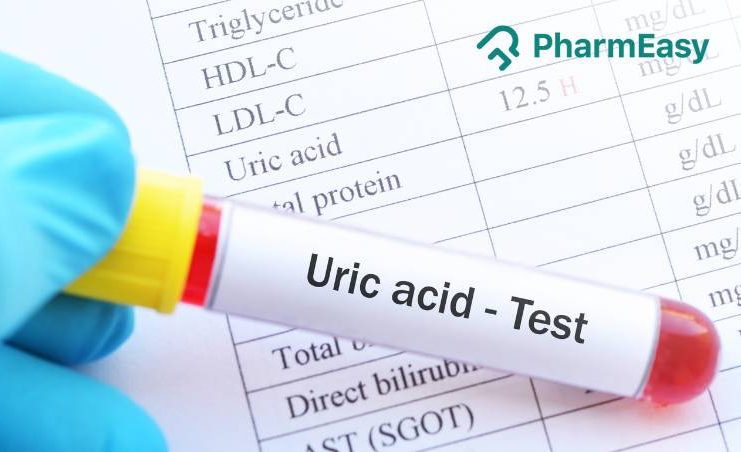High Uric Acid Level: Causes, Risks, Treatment, Prevention
By Dr. Mayuri Pandey +2 more

Get,

to manage your symptom
Get your,


4 Cr+ families
benefitted

OTP sent to 9988776655



You’ve successfully subscribed to receive
doctor-approved tips on
Whatsapp

Get ready to feel your best.

Hi There,
Download the PharmEasy App now!!


Register to Avail the Offer
Send OTPBy continuing, you agree with our Privacy Policy and Terms and Conditions

Hi There,
Sign up on PharmEasy now!!
Trusted by 4 crore+ families

OTP sent to 9988776655



You have unlocked 25% off on medicines




Code: NU25
By Dr. Mayuri Pandey +2 more
Table of Contents
Uric acid is a naturally occurring waste product produced when the body breaks down purine. Purine is a building block of DNA, which may be found in many foods and drinks. While uric acid is typically filtered out of the body by the kidneys and excreted in urine, high levels of uric acid can lead to a variety of health problems. Most people are familiar with the term ’uric acid’ even though there are many facts about this substance that are not well known. In this article, we will explore some of the lesser-known facts about uric acid. It is important for individuals to be aware of their uric acid levels and to work with their healthcare provider to maintain a healthy lifestyle and steer clear of health problems related to uric acid.
Abnormal levels of uric acid can be caused by a variety of factors, including diet, genetics, and certain medical conditions. Mentioned below are the two most common etiologies or the causes of high uric acid levels: overproduction of uric acid and decreased excretion of uric acid.

If you have high levels of uric acid, it’s important to talk to your doctor about ways to manage it and reduce the risks that will be discussed in the coming section.
High levels of uric acid (uricemia) in your body can increase the risk of the following conditions:
Gouty arthritis: Deposition of uric acid crystals in the joints causes severe pain, tenderness, and redness in the joint areas. Gouty arthritis is also a risk factor by itself for heart-related diseases.
Renal calculi: High levels of uric acid in the body cause the formation of what we call as kidney stones, which if left untreated can progress to renal failure.
Metabolic syndrome: Uricemia can cause high blood pressure, high blood glucose, abnormal cholesterol levels, and excess body fat together which increases the risk of stroke, diabetes, and heart diseases.
A serum or blood uric acid level below 6.8mg/dL is considered as normal. If your test results show a value higher than this, your doctor will decide the need for medications.1
Following are the different categories of medicines or uric acid lowering drugs as they are called, which may be prescribed to you to decrease the levels of uric acid: 4
Lifestyle modifications:
High uric acid levels in the body can be reduced by the following recommendations:4
Uric acid is a waste by-product formed when the body breaks down purine, a component of DNA. Normally, uric acid is filtered out of the body by the kidneys and excreted in the urine, but sometimes, high levels of uric acid can lead to gout, kidney stones, and cardiovascular disease among others. While there are several factors that can contribute to high uric acid levels, lifestyle changes, and medication can help to lower uric acid levels and prevent these conditions from developing. It is important for individuals to be aware of their uric acid levels and take steps to maintain a healthy lifestyle.
A serum or blood uric acid level below 6.8mg/dL is considered as normal.1
The two most common etiologies or the causes of high uric acid levels: are overproduction of uric acid and decreased excretion of uric acid.1
Avoid organ meats and other seafood, avoid the intake of alcohol, and reduce the intake of sweetened beverages.5
High levels of uric acid in the body can be reduced by proper weight management, drinking the right amount of fluids, and doing low to moderate-intensity exercises like yoga, cycling and, walking.4
The different categories of medicines or uric acid-lowering drugs include Xanthine oxidase inhibitors, Uricosurics and Uricases.4
Disclaimer: The information provided here is for educational/awareness purposes only and is not intended to be a substitute for medical treatment by a healthcare professional and should not be relied upon to diagnose or treat any medical condition. The reader should consult a registered medical practitioner to determine the appropriateness of the information and before consuming any medication. PharmEasy does not provide any guarantee or warranty (express or implied) regarding the accuracy, adequacy, completeness, legality, reliability or usefulness of the information; and disclaims any liability arising thereof.
Links and product recommendations in the information provided here are advertisements of third-party products available on the website. PharmEasy does not make any representation on the accuracy or suitability of such products/services. Advertisements do not influence the editorial decisions or content. The information in this blog is subject to change without notice. The authors and administrators reserve the right to modify, add, or remove content without notification. It is your responsibility to review this disclaimer regularly for any changes.

Leave your comment...
Comments